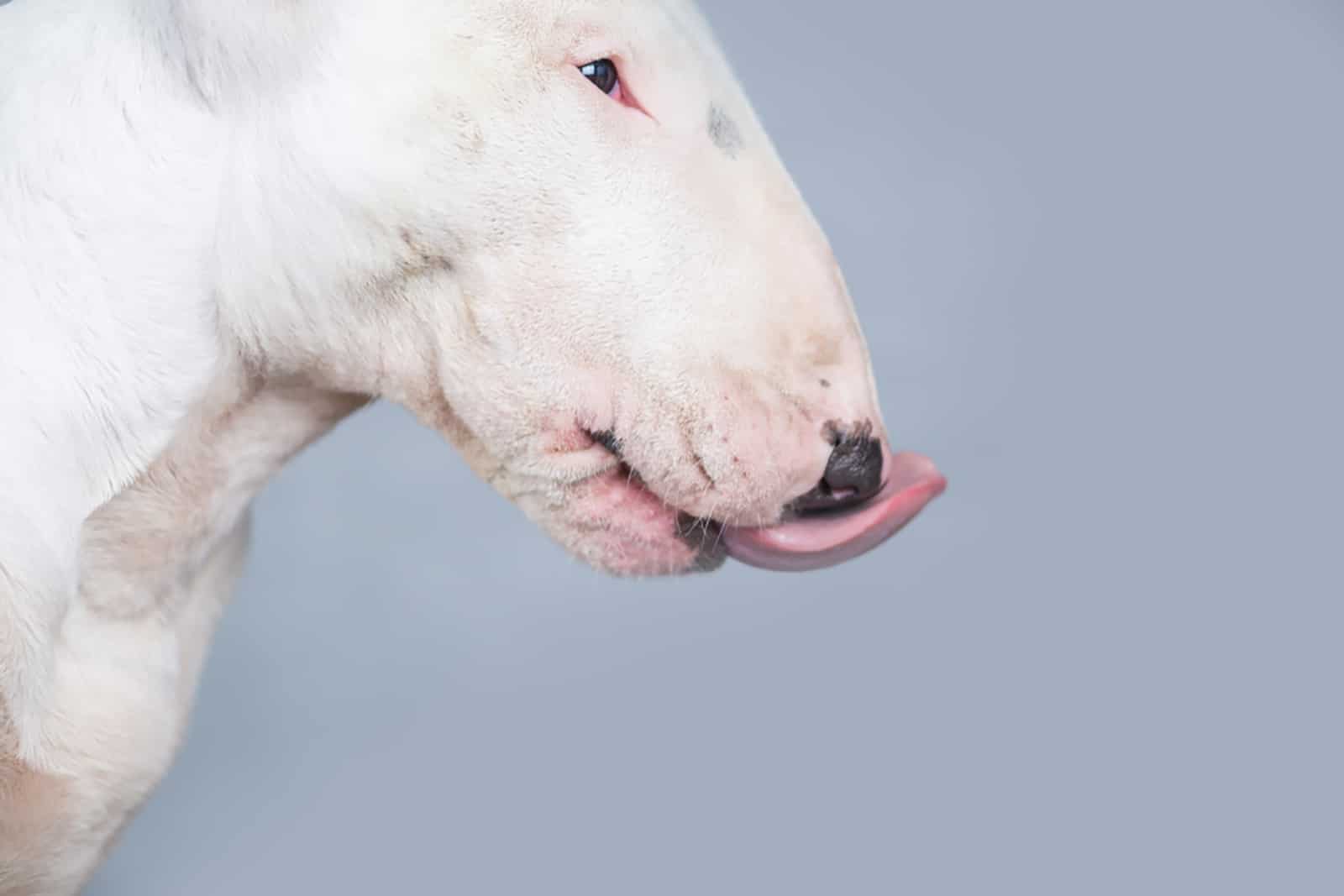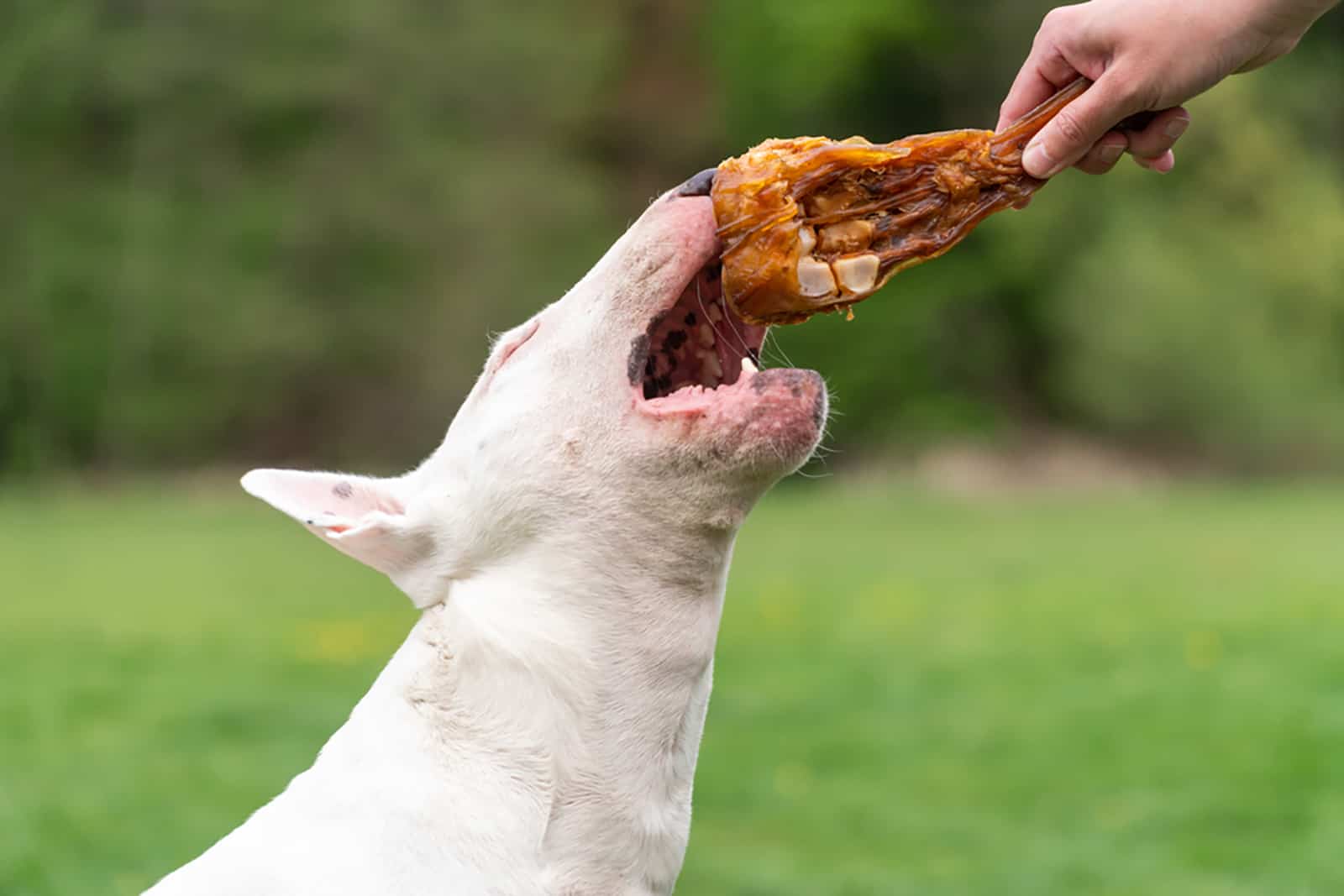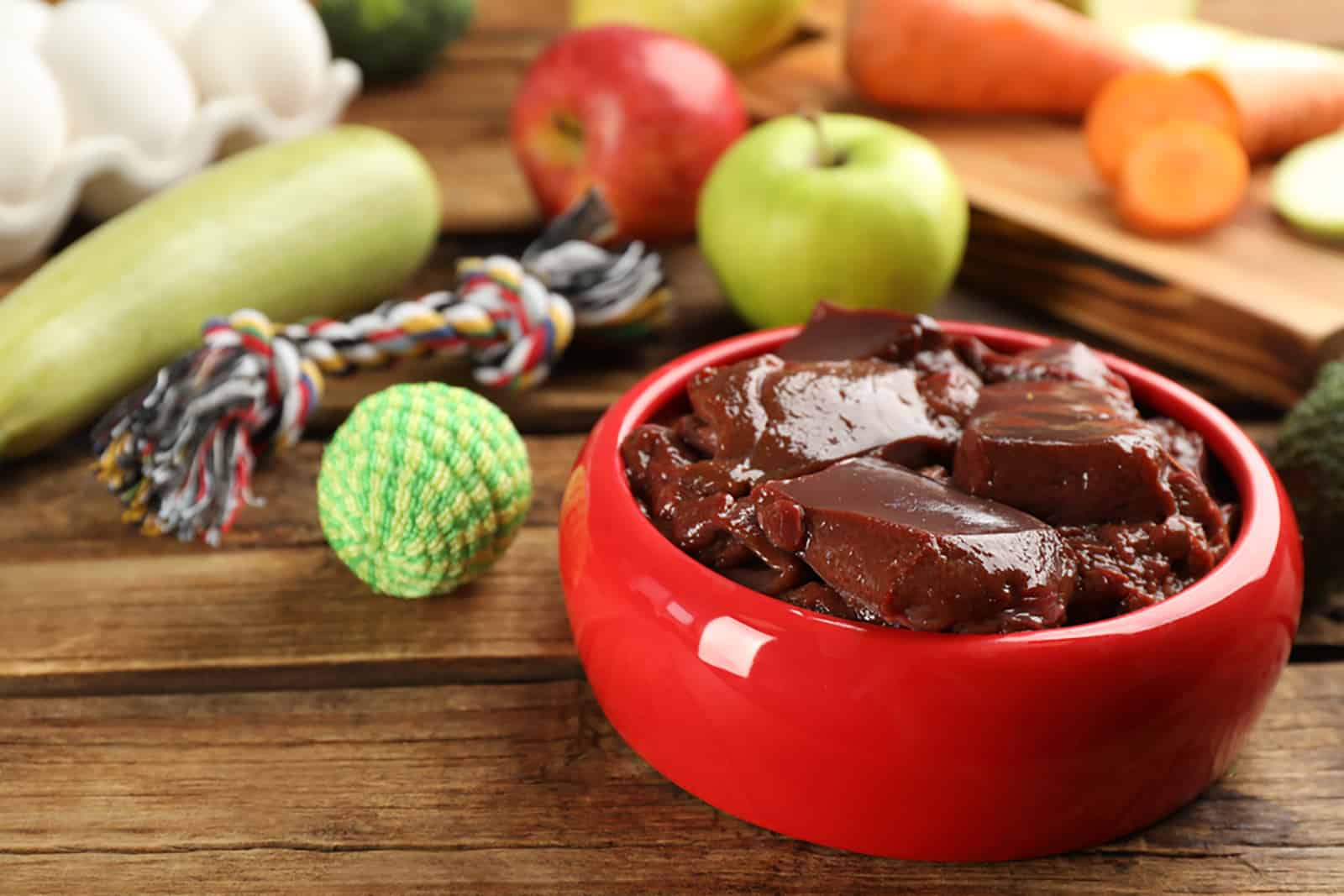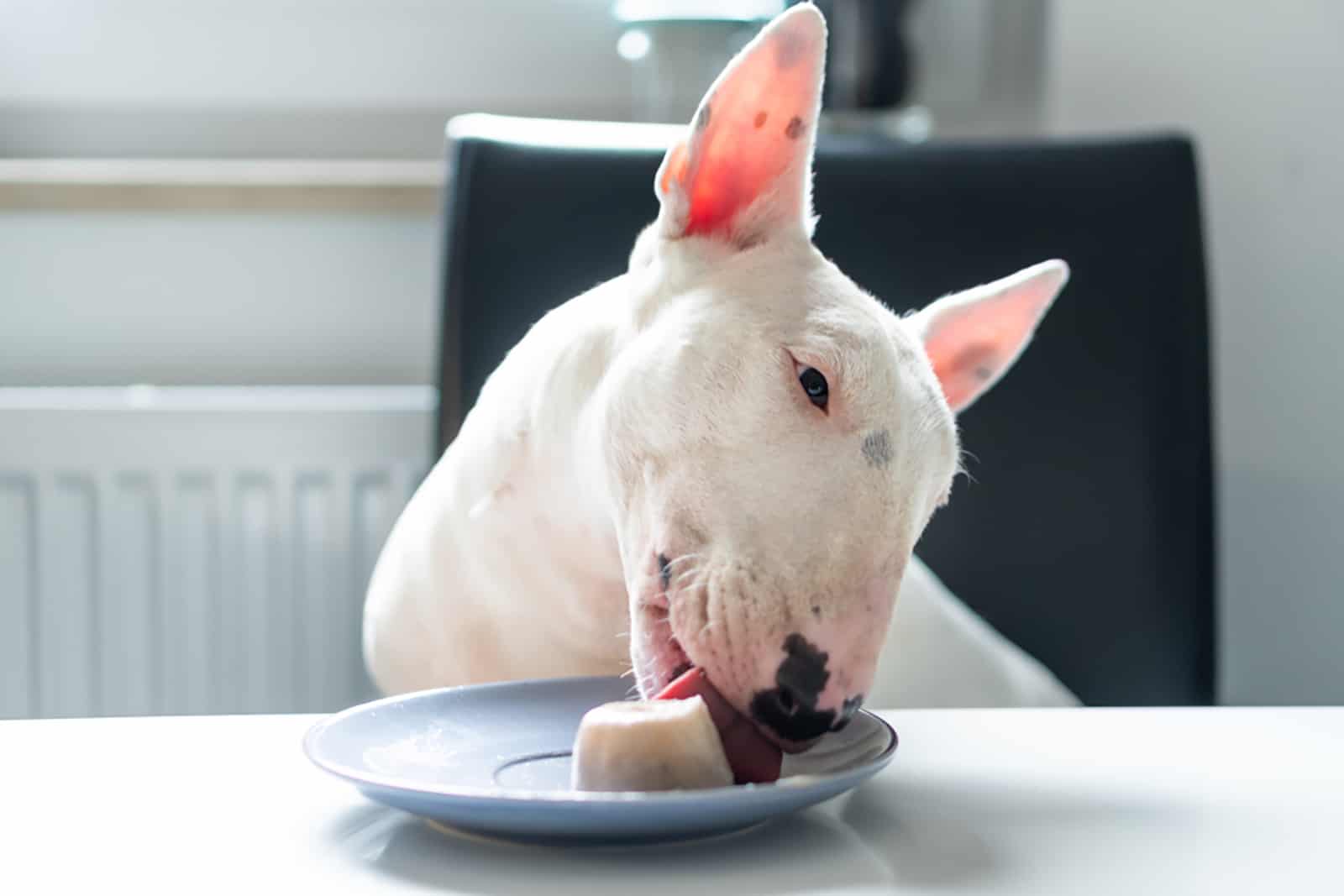Bull Terriers are unique medium-sized dogs that require a unique diet and feeding schedule. That’s right, even though Bull Terriers appear sleek and muscular, their bodies can drastically change if given an inappropriate diet.
It is not only their appearance that changes with inadequate feed, but Bull Terriers develop several health problems if their diet does not consist of healthy components.
A special feeding guide such as the Bull Terrier feeding chart is going to be very handy for new puppy owners.
If you are an aspiring Bull Terrier owner, an owner of a senior Bull Terrier, or if you are a first-time owner who just got a Bull Terrier puppy, then you can find out a lot about how to properly feed your dog in this article.
This Bull Terrier feeding chart can help owners figure out the perfect diet for their beloved Bullies.
Besides that, we will say a thing or two about the Bull Terrier’s growth, energy levels, healthy weight, and health problems that are linked to the dog’s diet.
Oh, wait for a second, we won’t be talking about the Staffordshire Bull Terrier dog breed. They may have similar names, but Bull Terriers are a different dog breed.
Bull Terrier Feeding Chart Preview
The Bull Terrier feeding chart is a useful tool for all owners; whether you got a new puppy, an adolescent Bully, or a senior one that requires a special kind of diet.
The Bull Terrier growth chart shows us that this is a medium-sized dog, which means that we can’t feed it a small or large dog diet.
With an adult dog’s weight range between 45 and 80 pounds, the Bull Terrier requires an abundant and sufficient diet.
[table id=550 /]
Bull Terrier Feeding Chart: Feeding Schedule

When it comes to Bull Terrier puppies, a good feeding schedule is crucial to ensure that they develop into healthy adult dogs.
Adult Bull Terriers require less frequent meals than puppies in development, but their grown-up bodies require bigger amounts of food. Older dogs require smaller but more frequent portions of food.
Are you wondering how many times per day a Bull Terrier dog needs? Here is a quick chart:
[table id=551 /]
Whether you own a purebred Bull Terrier or one of the Bull Terrier mixes, the feeding schedule is going to be the same for each stage of life.
How Many Times A Day Should You Feed A Bull Terrier?

There are several factors that play a role in how many times a day a Bull Terrier is fed — the first one being the dog’s age.
Now let’s get to the activity level factor. Even though the majority of Bull Terriers are active dogs, there are some that are less energetic and active. Some simply like to slack off and have a nap instead of going out chasing balls.
So, Bull Terriers that are less active require less food because they do not burn as many calories as physically active Bull Terriers.
And the last thing I want to mention is health problems. If a Bull Terrier is suffering from health issues such as kidney disease, then it will need a special homemade diet designed for dogs with kidney disease.
Besides choosing proper food ingredients, an unhealthy Bull Terrier dog is most likely going to have a reduced appetite and it will need to be fed smaller and mushier meals throughout the day.
Bull Terrier Puppies
As we previously mentioned, Bull Terrier puppies should be fed more frequently in comparison to their adult and senior counterparts.
That means that Bull Terrier puppies require three to four meals a day. But, some puppies are always hungry — hungrier than others and have a faster metabolism, so they may need to be fed up to five times per day.
Bull Terrier Adult Dogs
Adult Bull Terriers should be fed just the right amount of high-quality food, but they should not be fed as frequently as puppies.
Similar to other dog breeds, adult Bull Terriers should be fed two times per day — breakfast and dinner. But, only a few Bull
Terrier owners keep such a strict feeding schedule because they give their dogs treats and snacks. While there is nothing wrong with that, giving the adult Bull Terrier treats too often may cause it to develop obesity.
Bull Terrier Senior Dogs
Senior Bull Terriers are normally less active and their immune system is not as strong as it used to be. Therefore, senior Bull Terriers need an abundant and healthy diet that often contains supplements.
They should not be fed too often because their metabolism is slower than in adult Bull Terriers. Instead, it is advised to feed senior Bull Terriers twelve hours apart.
How Much Food Should A Bull Terrier Eat?

Similar to feeding frequency, the amount of food a Bull Terrier eats depends on its health status, age, and activity levels.
Another thing to add is that male Bull Terriers are larger than females and they require more food. On the other hand, pregnant
Bull Terriers need bigger amounts of nutritious food than males.
Amount Of Food For Bull Terrier Puppies
The amount of food a Bull Terrier puppy eats per day should not exceed four cups per day. The Bull Terrier puppy is small which means its stomach is small too.
Giving a Bull Terrier puppy too much puppy food in one meal may result in an upset stomach, vomiting, and puppy diarrhea.
Puppy diarrhea can occur at night if puppies are fed too much food during dinner time. Depending on the vomit color, owners can decipher whether it is undigested food their Bull Terrier puppy has vomited or was it yellow bile.
Amount Of Food For Bull Terrier Adult Dogs
Adult Bull Terriers are already full-grown and they need a balanced diet to maintain a good physique. This is why adult Bull Terriers should be fed up to four cups per day. Make sure to stick to the two-meal-a-day rule.
Feeding adult Bull Terriers too often may result in them developing canine obesity which is never a good thing.
Bull Terriers are made to be active and athletic dogs, so feeding them too much adult food is going to make them chubby, less active, and unhealthy.
Amount Of Food For Bull Terrier Senior Dogs
Senior Bull Terriers should be fed a light diet that does not exceed three cups a day.
On average, Bull Terriers live between 12 and 14 years, and by the age of 10, they are already senior dogs.
Owners must pay attention to what and how much they feed their senior Bull Terriers because the majority of these senior pups either suffer from breed-specific health issues or simply have a slower metabolism that causes slower digestion.
Bull Terrier Feeding Chart: Important Food Ingredients
So you got yourself a new Bull Terrier puppy and the breeder has given you a puppy food sample. Now that you ran out of it, it’s time to search for new food.
But, what are the ingredients that you should look for in commercial food for your Bull Terrier dog?
The short and the right answer would be “quality ingredients” of course. Wondering what kind of quality ingredients I am talking about? Take a look!
Protein
The simplest and the most important ingredient in Bull Terrier dog food is a protein that derives from animal meat. We’re talkin’ chicken, beef, pork, turkey, and fish which are the most common protein sources in high-quality dog food.
Unfortunately, the market is full of bad dog food brands that do not offer a high amount of protein in dog food which does not benefit the overall health of the Bull Terrier dog.
Because the Bull Terrier is a Bully breed, good quality dog food for American Bully dogs can be incorporated into its diet. This kind of dog food is packed with protein that aids in healthy weight gain and healthy muscle mass gain.
Fatty Acids
New Bull Terrier owners often frown upon fatty acids because of the word “fat” which is misleading. In reality, fatty acids are healthy and very beneficial to all dog breeds, especially for the Bull Terrier breed.
Feeding your Bull Terrier food that is packed with healthy fatty acids like omega-3 and omega-6 is key to reducing the shedding amount.
Additionally, healthy fatty acids found in fish oils and flaxseed make the Bull Terrier’s coat color bright and its hair shinier than ever!
If you want to make homemade dog food using all-natural ingredients, then your Bull Terrier will get a hefty amount of fatty acids from poultry, pork, and beef fat.
Carbohydrates
Oh, carbs, another Bull Terrier food ingredient that the majority of puppy owners believe n is bad. Bull Terriers (and other dog breeds) have difficulties digesting carbohydrates such as peas, white rice, and potatoes.
But, there are healthy carbohydrates such as brown rice and whole oats that are good for Bull Terrier dogs.
They help with food digestion and carbs like brown rice can even make the Bull Terrier dog feel better if it is suffering from an upset stomach.
Good quality dog foods, such as Kindfull dog food have a healthy ratio of carbohydrates, fatty acids, and animal protein.
You see, carbohydrates are very much needed in the Bull Terrier’s balanced diet. In fact, Bull Terrier puppies require up to 35% of carbohydrates in their meals.
However, it is important to note that Bull Terriers can gain a lot of weight if their diet consists of too many carbs. So, it may not take long for the puppy to gain weight if it eats (un)healthy carbs too often.
Vitamins And Minerals
We all know that vitamins and minerals are those little but very important food compounds in general. That said, the Bull Terrier dog requires a daily intake of vitamins such as AD3E, vitamin B12, and vitamin C.
Minerals like calcium, magnesium, zinc, sodium, phosphorus, and iron keep the Bull Terrier’s overall health in great condition.
Supplements
Supplements containing vitamins, amino acids, and minerals are often given to Bull Terrier dogs whose immune system is compromised due to a health problem.
In other words, supplements aid in Bull Terrier’s faster recovery by strengthening its immune system.
Besides unhealthy Bull Terriers, supplements can be given to those that are on a raw diet.
Senior Bull Terriers consume dietary supplements to keep their bones and joints in good condition. Veterinarians and/or veterinary nutritionists will tell you whether or not your Bull Terrier needs additional supplements in its diet.
What Is The Best Diet For A Bull Terrier?

The Bull Terrier is not a large dog which is why owners must pay attention to choosing the right diet that is suitable for its medium size.
There is no uniform “best diet” for a Bull Terrier because each dog has a different metabolism and a different digestive system.
The best diet for a Bull Terrier will be the one that your dog enjoys.
Also, the best diet for a Bull Terrier is the one in which you will see progress in your dog’s development and overall health.
Raw Diet
Let’s go back to the basics — feeding your Bull Terrier raw meat (BARF diet).
Raw meat is a fully natural ingredient that dogs have consumed prior to becoming our furry friends. So, it is perfectly safe to feed your Bull Terrier a raw diet.
In fact, it is even desirable to feed your Bull Terrier raw meat because of the many health benefits.
Large dogs like the Newfoundland, Great Pyrenees, and Cane Corso are often fed a raw diet. Even small dogs like the Chihuahua benefit from eating raw meat.
Once it reaches two months of age, the Bull Terrier puppy can start transitioning to raw food.
For those puppy owners who are worried about canine foodborne diseases, they can always boil chicken or beef for their Bull Terrier puppy.
While a raw diet has its benefits, the Bull Terrier puppy’s nutritional needs may not be satisfied by raw meat alone. It may need additional supplements to its diet.
Dry Food
High-quality kibble is the most favorable diet for Bull Terrier dogs because it has just the right amount of each important food ingredient. Dry food works great for all dogs of all shapes and sizes, from Great Danes to Pit Bulls, to Chihuahuas.
In addition to its nutritional values, dry food can help scrape off tartar buildup from the Bull Terrier’s teeth.
If your Bull Terrier is strictly on a dry food diet, then do not be surprised if it drinks a lot of water after each meal.
Grain-Free Diet
It seems that there is always a debate on whether or not you should feed a Bull Terrier a grain-free diet. Well, in theory, a grain-free diet is healthy for Bull Terrier dogs, but in reality, grain-free dog foods may contain “bad” carbohydrates such as peas.
So, due to high levels of carbohydrates, a grain-free diet may cause your Bull Terrier to become chunky and obese.
But, the grain-free diet is not all that bad because Bull Terriers easily digest such foods and are less allergic to grain-free ingredients. In the end, it all depends on how the Bull Terrier reacts to the grain-free diet.
It is best to ask your veterinarian whether or not your Bull Terrier should be on a grain-free diet.
Wet Food
Bull Terriers enjoy wet food just as much as they enjoy dry food. When compared to kibble, wet food is…Wet! Even though wet food is yummy to Bull Terriers, their diet should not be based on wet food alone.
Not only will you need twice the amount of wet food than dry food to feed your Bull Terrier, but there is also a risk of your pup developing plaque and periodontal disease.
Conclusion
With their short coats and lean bodies, Bull Terriers are not a lot of maintenance. But, the Bull Terrier’s overall health depends greatly on the quality and amount of food it eats.
Keep in mind that a nutritious diet is extremely important for the Bull Terriers to function properly and to maintain their muscular body in good condition.
There are two things that you should be very picky about — choosing the best Bull Terrier breeder and choosing the best food for your new Bull Terrier puppy!
While this Bull Terrier feeding chart provides a lot of information about how to feed your new puppy, I advise you to talk to your veterinarian.
Every Bull Terrier puppy is different and it will require a unique diet that is designed especially for it.
So, take this Bull Terrier feeding chart as a quick feeding guide, but talk to the vet or veterinary nutritionist for further advice and tips — your Bull Terrier puppy will thank you!
Related Content
English Bulldog Feeding Chart: How Much Food Is Enough?
